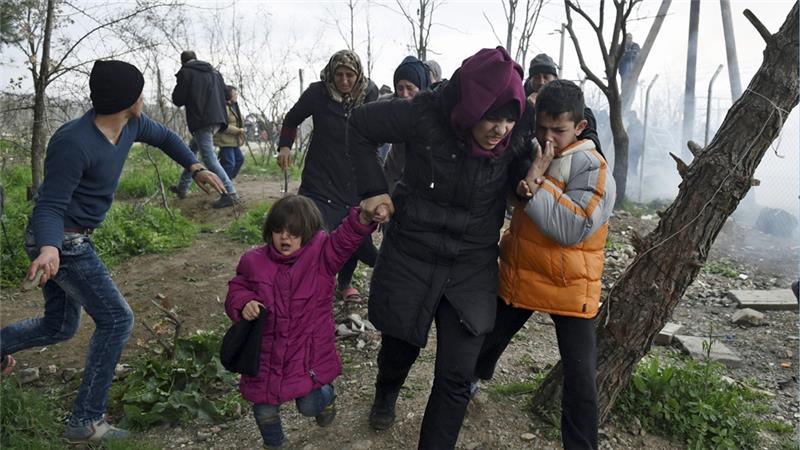-
Tips for becoming a good boxer - November 6, 2020
-
7 expert tips for making your hens night a memorable one - November 6, 2020
-
5 reasons to host your Christmas party on a cruise boat - November 6, 2020
-
What to do when you’re charged with a crime - November 6, 2020
-
Should you get one or multiple dogs? Here’s all you need to know - November 3, 2020
-
A Guide: How to Build Your Very Own Magic Mirror - February 14, 2019
-
Our Top Inspirational Baseball Stars - November 24, 2018
-
Five Tech Tools That Will Help You Turn Your Blog into a Business - November 24, 2018
-
How to Indulge on Vacation without Expanding Your Waist - November 9, 2018
-
5 Strategies for Businesses to Appeal to Today’s Increasingly Mobile-Crazed Customers - November 9, 2018
Refugees Stuck On Greek-Macedonian Border, 300 Let In
REUTERS/Yannis BehrakisA Syrian refugee father holds his daughter while he and hundreds of others line up at the Greek-Macedonian border February 27, 2016 as the border crossing is reopened briefly near the Greek village of Idomeni. Greece is fast becoming the “warehouse of human beings” that its government has vowed to not allow.
Advertisement
Migrants walk along a road towards the Macedonian-Greek border, near the town of Polikastro, Greece February 23, 2016.
The build-up at Idomeni camp, which can accomodate up to 1,500 people but is sheltering more than 7,000, began in earnest last week after Macedonia began refusing entry to Afghans and imposed stricter controls on Syrians and Iraqis.
Merikarhu, a Finnish Border Guard vessel part of EU’s Frontex forces deployment, patrols on the Aegean Sea, between the eastern Greek Island of Agathonisi and the nearby Turkish shores, Monday, Feb. 29, 2016.
Earlier on Monday, a crush had developed along the frontier after rumours spread that Macedonian authorities had opened the border after several hours of it remaining sealed shut.
Police also used stun grenades to calm the crowd, Associated Press said, several migrants were almost trampled and one officer injured.
The protests have left thousands of refugees stranded in tent camps.
Greece has warned that the number of migrants trapped on its soil could more than triple in coming weeks, reaching as many as 70,000, following border shutdowns throughout the Balkans.
About 22,000 people are in Greece seeking to travel to countries in northern Europe, with thousands stuck at the Macedonian border. Syrian refugee Nidal Jojack, 45, said she has been camped out with her family at Idomeni for three days and nights.
At least 30 people, including many children, requested first aid, the charity Doctors of the World said. “It was very cold”. There has been a so-called domino effect, as countries including Germany, Sweden, Austria and Hungary have all partially or completely closed off their borders.
“We are using all available instruments to address emergency needs (…) including the reinforcement of reception capacities, border management, relocation and returns”, commission representative Mina Andreeva told reporters in Brussels. “Then, I would invite her to take the people, who arrive in Greece now and whom she wants to take care of, directly to Germany”, Hans Peter Doskozil told Austrian’s Oe1 radio.
The Idomeni crossing is a key point on the mass migration route that has prompted a major Europe-wide crisis.
But Austria quickly hit back at criticism of its tougher migrant policy, describing it as “absurd”.
As the bottleneck showed little sign of easing, German Chancellor Angel Merkel lashed out at a raft of restrictions imposed by Austria and the Balkan states, saying they risked plunging debt-ridden Greece into refugee chaos. “Last night we slept outside”, said Saud Bezara, from Idlib in Syria. “This is exactly what I fear: When one country defines its limit, another must suffer”.
The survey also found that 92 percent believed the European Union had failed to support Greece sufficiently, and 60 percent believed it was important for the country not to exit Europe’s passport-free Schengen zone.
Advertisement
Reinhold Mitterlehner said the “upper limits are necessary (and) we’re going to maintain them”.





























